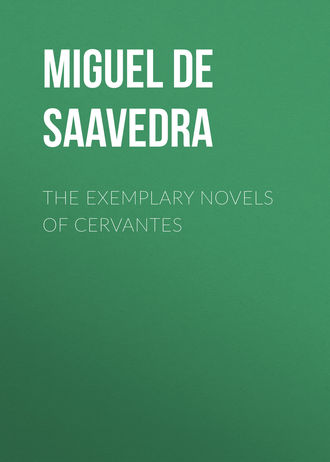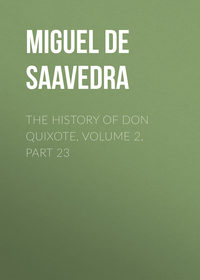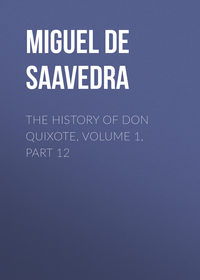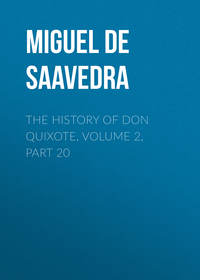 полная версия
полная версияThe Exemplary Novels of Cervantes
The gipsy had an ass with a docked tail, and he fitted a false tail to the stump so well that it seemed quite natural. Then he took the ass to market and sold it to a countryman for ten ducats. Having pocketed the money, he told the countryman that if he wanted another ass, own brother to the one he had bought, and every bit as good, he might have it a bargain. The countryman told him to go and fetch it, and meanwhile he would drive that one home. Away went the purchaser; the gipsy followed him, and some how or other, it was not long before he had stolen the ass, from which he immediately whipped off the false tail, leaving only a bare stump. He then changed the halter and saddle, and had the audacity to go and offer the animal for sale to the countryman, before the latter had discovered his loss. The bargain was soon made; the purchaser went into his house to fetch the money to pay for the second ass, and there he discovered the loss of the first. Stupid as he was, he suspected that the gipsy had stolen the animal, and he refused to pay him. The gipsy brought forward as witness the man who had received the alcabala63 on the first transaction, and who swore that he had sold the countryman an ass with a very bushy tail, quite different from the second one; and an alguazil, who was present, took the gipsy's part so strongly that the countryman was forced to pay for the ass twice over. Many other stories they told, all about stealing beasts of burden, in which art they are consummate masters. In short, they are a thoroughly bad race, and though many able magistrates have taken them in hand, they have always remained incorrigible.
After I had remained with them twenty days, they set out for Murcia, taking me with them. We passed through Granada, where the company was quartered to which my master the drummer belonged. As the gipsies were aware of this, they shut me up in the place where they were lodged. I overheard them talking about their journey, and thinking that no good would come of it, I contrived to give them the slip, quitted Granada, and entered the garden of a Morisco,64 who gladly received me. I was quite willing to remain with him and watch his garden, – a much less fatiguing business in my opinion than guarding a flock of sheep; and as there was no need to discuss the question of wages, the Morisco soon had a servant and I a master. I remained with him more than a month, not that the life I led with him was much to my liking, but because it gave me opportunities of observing that of my master, which was like that of all the other Moriscoes in Spain. O what curious things I could tell you, friend Scipio, about that half Paynim rabble, if I were not afraid that I should not get to the end of my story in a fortnight! Nay, if I were to go into particulars, two months would not be enough. Some few specimens, however, you shall hear.
Hardly will you find among the whole race one man who is a sincere believer in the holy law of Christianity. Their only thought is how to scrape up money and keep it; and to this end they toil incessantly and spend nothing. The moment a real falls into their clutches, they condemn it to perpetual imprisonment; so that by dint of perpetually accumulating and never spending, they have got the greater part of the money of Spain into their hands. They are the grubs, the magpies, the weasels of the nation. Consider how numerous they are, and that every day they add much or little to their hoards, and that as they increase in number so the amount of their hoarded wealth must increase without end. None of them of either sex make monastic vows, but all marry and multiply, for thrifty living is a great promoter of fecundity. They are not wasted by war or excessive toil; they plunder us in a quiet way, and enrich themselves with the fruits of our patrimonies which they sell back to us. They have no servants, for they all wait upon themselves. They are at no expense for the education of their sons, for all their lore is but how to rob us. From the twelve sons of Jacob, who entered Egypt, as I have heard, there had sprung, when Moses freed them from captivity, six hundred thousand fighting men, besides women and children. From this we may infer how much the Moriscoes have multiplied, and how incomparably greater must be their numbers.
Scip. Means have been sought for remedying the mischiefs you have mentioned and hinted at; and, indeed, I am sure that those which you have passed over in silence, are even more serious than those which you have touched upon. But our commonwealth has most wise and zealous champions, who, considering that Spain produces and retains in her bosom such vipers as the Moriscoes, will, with God's help, provide a sure and prompt remedy for so great an evil. Go on.
Berg. My master being a stingy hunks, like all his caste, I lived like himself chiefly on maize bread and buckwheat porridge; but this penury helped me to gain paradise, in the strange manner you shall hear. Every morning, by daybreak, a young man used to seat himself at the foot of one of the many pomegranate trees. He had the look of a student, being dressed in a rusty suit of threadbare baize, and was occupied in writing in a note book, slapping his forehead from time to time, biting his nails, and gazing up at the sky. Sometimes he was so immersed in reverie, that he neither moved hand nor foot, nor even winked his eyes. One day I drew near him unperceived, and heard him muttering between his teeth. At last, after a long silence, he cried out aloud, "Glorious! The very best verse I ever composed in my life!" and down went something in his note book. From all this, it was plain that the luckless wight was a poet. I approached him with my ordinary courtesies, and when I had convinced him of my gentleness, he let me lie down at his feet, and resumed the course of his thoughts, scratching his head, falling into ecstacies, and then writing as before.
Meanwhile there came into the garden another young man, handsome and well dressed, with papers in his hand, at which he glanced from time to time. The new comer walked up to the pomegranate tree, and said to the poet, "Have you finished the first act?"
"I have just this moment finished it in the happiest manner possible," was the reply.
"How is that?"
"I will tell you! His Holiness the Pope comes forth in his pontificals, with twelve cardinals in purple canonicals – for the action of my comedy is supposed to take place at the season of mutatio caparum, when their eminences are not dressed in scarlet but in purple – therefore propriety absolutely requires that my cardinals should wear purple. This is a capital point, and one on which your common run of writers would be sure to blunder; but as for me I could not go wrong, for I have read the whole Roman ceremonial through, merely that I might be exact as to these dresses."
"But where do you suppose," said the other, "that our manager is to find purple robes for twelve cardinals?"
"If a single one is wanting," cried the poet, "I would as soon think of flying, as of letting my comedy be represented without it. Zounds! is the public to lose that magnificent spectacle! Just imagine the splendid effect on the stage of a supreme Pontiff and twelve grave cardinals, with all the other dignitaries, who will of course accompany them! By heavens, it will be one of the grandest things ever seen on the stage, not excepting even the nosegay of Duraja!"
I now perceived that one of these young men was a poet, and the other a comedian. The latter advised the former that he should cut out a few of his cardinals, if he did not want to make it impossible for the manager to produce the piece. The poet would not listen to this, but said they might be thankful that he had not brought in the whole conclave, to be present at the memorable event which he proposed to immortalise in his brilliant comedy. The player laughed, left him to his occupation, and returned to his own, which was studying a part in a new play. The poet, after having committed to writing some verses of his magnificent comedy, slowly and gravely drew from his pocket some morsels of bread, and about twenty raisins, or perhaps not so many, for there were some crumbs of bread among them, which increased their apparent number. He blew the crumbs from the raisins, and ate them one by one, stalks and all, for I did not see him throw anything away, adding to them the pieces of bread, which had got such a colour from the lining of his pocket, that they looked mouldy, and were so hard that he could not get them down, though he chewed them over and over again. This was lucky for me, for he threw them to me, saying, "Catch, dog, and much good may it do you." Look, said I to myself, what nectar and ambrosia this poet gives me; for that is the food on which they say these sons of Apollo are nourished. In short, great for the most part is the penury of poets; but greater was my need, since it obliged me to eat what he left.
As long as he was busy with the composition of his comedy he did not fail to visit the garden, nor did I want crusts, for he shared them with me very liberally; and then we went to the well, where we satisfied our thirst like monarchs, I lapping, and he drinking out of a pitcher. But at last the poet came no more, and my hunger became so intolerable, that I resolved to quit the Morisco and seek my fortune in the city. As I entered it, I saw my poet coming out of the famous monastery of San Geronimo. He came to me with open arms, and I was no less delighted to see him. He immediately began to empty his pockets of pieces of bread, softer than those he used to, carry to the garden, and to put them between my teeth without passing them through his own. From the softness of the bits of bread, and my having seen my poet come out of the monastery, I surmised that his muse, like that of many of his brethren, was a bashful beggar. He walked into the city, and I followed him, intending to take him for my master if he would let me, thinking that the crumbs from his table might serve to support me, since there is no better or ampler purse than charity, whose liberal hands are never poor.
After some time, we arrived at the house of a theatrical manager, called Angulo the Bad, to distinguish him from another Angulo, not a manager but a player, one of the best ever seen. The whole company was assembled to hear my master's comedy read; but before the first act was half finished, all had vanished, one by one, except the manager and myself, who formed the whole audience. The comedy was such that to me, who am but an ass in such matters, it seemed as though Satan himself had composed it for the utter ruin and perdition of the poet; and I actually shivered with vexation to see the solitude in which his audience had left him. I wonder did his prophetic soul presage to him the disgrace impending over him; for all the players – and there were more than twelve of them – came back, laid hold on the poet, without saying a word, and, had it not been for the authoritative interference of the manager, they would have tossed him in a blanket. I was confounded by this sad turn of affairs, the manager was incensed, the players very merry; and the poor forlorn poet, with great patience, but a somewhat wry face, took the comedy, thrust it into his bosom, muttering, "It is not right to cast pearls before swine," and sadly quitted the place without another word. I was so mortified and ashamed that I could not follow him, and the manager caressed me so much that I was obliged to remain; and within a month I became an excellent performer in interludes and pantomimes. Interludes, you know, usually end with a cudgelling bout, but in my master's theatre they ended with setting me at the characters of the piece, whom I worried and tumbled one over the other, to the huge delight of the ignorant spectators, and my master's great gain.
Oh, Scipio! what things I could tell you that I saw among these players, and two other companies to which I belonged; but I must leave them for another day, for it would be impossible to compress them within moderate limits. All you have heard is nothing to what I could relate to you about these people and their ways, their work and their idleness, their ignorance and their cleverness, and other matters without end, which might serve to disenchant many who idolise these fictitious divinities.
Scip. I see clearly, Berganza, that the field is large; but leave it now, and go on.
Berg. I arrived with a company of players in this city of Valladolid, where they gave me a wound in an interlude that was near being the death of me. I could not revenge myself then, because I was muzzled, and I had no mind to do so afterwards in cold blood; for deliberate vengeance argues a cruel and malicious disposition. I grew weary of this employment, not because it was laborious, but because I saw in it many things which called for amendment and castigation; and, as it was not in my power to remedy them, I resolved to see them no more, but to take refuge in an abode of holiness, as those do who forsake their vices when they can no longer practise them; but better late than never. Well, then, seeing you one night carrying the lantern with that good Christian Mahudes, I noticed how contented you were, how righteous and holy was your occupation. Filled with honest emulation, I longed to follow your steps; and, with that laudable intention, I placed myself before Mahudes, who immediately elected me your companion, and brought me to this hospital. What has occurred to me since I have been here would take some time to relate. I will just mention a conversation I heard between four invalids, who lay in four beds next each other. It will not take long to tell, and it fits in here quite pat.
Scip. Very well; but be quick, for, to the best of my belief, it cannot be far from daylight.
Berg. The four beds were at the end of the infirmary, and in them lay an alchemist, a poet, a mathematician, and one of those persons who are called projectors.
Scip. I recollect these good people well.
Berg. One afternoon, last summer, the windows being closed, I lay panting under one of their beds, when the poet began piteously to bewail his ill fortune. The mathematician asked him what he complained of.
"Have I not good cause for complaint?" he replied. "I have strictly observed the rule laid down by Horace in his Art of Poetry, not to bring to light any work until ten years after it has been composed. Now, I have a work on which I was engaged for twenty years, and which has lain by me for twelve. The subject is sublime, the invention perfectly novel, the episodes singularly happy, the versification noble, and the arrangement admirable, for the beginning is in perfect correspondence with the middle and the end. Altogether it is a lofty, sonorous, heroic poem, delectable and full of matter; and yet I cannot find a prince to whom I may dedicate it – a prince, I say, who is intelligent, liberal, and magnanimous. Wretched and depraved age this of ours!"
"What is the subject of the work?" inquired the alchemist.
"It treats," said the poet, "of that part of the history of king Arthur of England which archbishop Turpin left unwritten, together with the history of the quest of the Sangreal, the whole in heroic measure, – part rhymes, part blank-verse; and in dactyles moreover, that is to say, in dactylic noun substantives, without any admission of verbs."
"For my part, I am not much of a judge in matters of poetry," returned the alchemist, "and therefore I cannot precisely estimate the misfortune you complain of; but in any case it cannot equal my own in wanting means, or a prince to back me and supply me with the requisites, for prosecuting the science of alchemy; but for which want alone I should now be rolling in gold, and richer than ever was Midas, Crassus, or Croesus."
"Have you ever succeeded, Señor Alchemist," said the mathematician, "in extracting gold from the other metals?"
"I have not yet extracted it," the alchemist replied, "but I know for certain that the thing is to be done, and that in less than two months more I could complete the discovery of the philosopher's stone, by means of which gold can be made even out of pebbles."
"Your worships," rejoined the mathematician, "have both of you made a great deal of your misfortunes; but after all, one of you has a book to dedicate, and the other is on the point of discovering the philosopher's stone, by means of which he will be as rich as all those who have followed that course. But what will you say of my misfortune, which is great beyond compare? For two and twenty years I have been in pursuit of the fixed point; here I miss it, there I get sight of it again, and just when it seems that I am down upon it so that it can by no means escape me, I find myself on a sudden so far away from it that I am utterly amazed. It is just the same with the quadrature of the circle. I have been within such a hair's breadth of it, that I cannot conceive how it is that I have not got it in my pocket. Thus I suffer a torment like that of Tantalus, who starves with fruits all round him, and burns with thirst with water at his lip. At one moment I seem to grasp the truth, at another it is far away from me; and, like another Sisyphus, I begin again to climb the hill which I have just rolled down, along with all the mass of my labours."
The projector, who had hitherto kept silence, now struck in. "Here we are," he said, "four complainants, brought together by poverty under the roof of this hospital. To the devil with such callings and employments, as give neither pleasure nor bread to those who exercise them! I, gentlemen, am a projector, and have at various times offered sundry valuable projects to his majesty, all to his advantage, and without prejudice to the realm; and I have now a memorial in which I supplicate his majesty to appoint a person to whom I may communicate a new project of mine, which will be the means of entirely liquidating all his debts. But from the fate which all my other memorials have had, I foresee that this one also will be thrown into the dust-hole. Lest, however, your worships should think me crack-brained, I will explain my project to you, though this be in some degree a publication of my secret.
"I propose that all his majesty's vassals, from the age of fourteen to sixty, be bound once a month, on a certain appointed day, to fast on bread and water; and that the whole expenditure, which would otherwise be made on that day for food, including fruit, meat, fish, wine, eggs, and vegetables, be turned into money, and the amount paid to his majesty, without defrauding him of a doit, as each shall declare on oath. By this means, in the course of twenty years the king will be freed from all debts and incumbrances. The calculation is easily made. There are in Spain more than three millions of persons of the specified age, exclusive of invalids, old, and young, and there is not one of these but spends at least a real and a half daily; however, I am willing to put it at a real only, and less it cannot be, even were they to eat nothing but leeks. Now does it not strike your worships that it would be no bad thing to realise every month three millions of reals, all net and clear as if they were winnowed and sifted? The plan, moreover, instead of a loss to his majesty's subjects, would be a real advantage to them; for by means of their fasts they would make themselves acceptable to God and would serve their king, and some of them even might find it beneficial to their health. The project is in every way admirable, as you must confess; the money too might be collected by parishes, without the cost of tax gatherers and receivers, those plagues and bloodsuckers of the realm."
The others all laughed at the projector's scheme, and even he himself joined in the laugh at last. For my part I found much matter for reflection in the strange conversation I had heard, and in the fact that people such as these usually end their days in a hospital.
Scip. That is true, Berganza. Have you anything more to say?
Berg. Two things more and then I shall have done, for I think day is beginning to dawn. One day I accompanied Mahudes to ask for alms in the house of the corregidor of this city, who is a great cavalier and a very great Christian. We found him alone, and I thought fit to take advantage of that opportunity to give him certain counsels which I had gathered from the lips of an old invalid in this hospital, who was discussing the means of saving from perdition those vagabond girls who take to a life of vice to avoid labour, – an intolerable evil demanding an immediate and effectual remedy. Wishing to impart what I had heard to the corregidor, I lifted up my voice, thinking to speak; but instead of articulate speech I barked so loudly that the corregidor called out in a passion to his servants to drive me out of the room with sticks; whereupon one of them caught up a copper syphon, which Was the nearest thing at hand, and thrashed me with it so, that I feel it in my ribs to this hour.
Scip. And do you complain of that, Berganza?
Berg. Nay; have I not reason to complain, since I feel the pain even now; and since it appears to me that my good intentions merited no such chastisement?
Scip. Look you, Berganza, no one should interfere where he is not wanted, nor take upon himself a business that in no wise is his concern. Besides, you ought to know, that the advice of the poor, however good it may be, is never taken; nor should the lowly presume to offer advice to the great, who fancy they know everything. Wisdom in a poor man lies under a cloud, and cannot be seen; or if by chance it shines through it, people mistake it for folly, and treat it with contempt.
Berg. You are right, Scipio; and having had the lesson well beaten into me, I will henceforth act accordingly. That same night I entered the house of a lady of quality, who had in her arms a little lap-dog, so very diminutive that she could have hid it in her bosom. The instant it saw me, it flew at me out of its mistress's arms, barking with all its might, and even went so far as to bite my leg. I looked at it with disgust, and said to myself, "If I met you in the street, paltry little animal, either I would take no notice of you at all, or I would make mince meat of you." The little wretch was an example of the common rule – that mean-souled persons when they are in favour are always insolent, and ready to offend those who are much better than themselves, though inferior to them in fortune.
Scip. We have many instances of this in worthless fellows, who are insolent enough under cover of their masters' protection; but if death or any other chance brings down the tree against which they leaned, their true value becomes apparent, since they have no other merit than that borrowed from their patrons; whilst virtue and good sense are always the same, whether clothed or naked, alone or accompanied. But let us break off now; for the light beaming in through those chinks shows that the dawn is far advanced.
Berg. Be it so; and I trust in heaven that to-night we shall find ourselves in a condition to renew our conversation.
The licentiate finished the reading of this dialogue, and the Alferez his nap, both at the same time. "Although this colloquy is manifestly fictitious," said the licentiate, "it is, in my opinion, so well composed, that the Señor Alferez may well proceed with the second part."
"Since you give me such encouragement, I will do so," replied the alferez, "without further discussing the question with you, whether the dogs spoke or not."
"There is no need that we should go over that ground again," said the licentiate. "I admire the art and the invention you have displayed in the dialogue, and that is enough. Let us go to the Espolon,65 and recreate our bodily eyes, as we have gratified those of our minds."
"With all my heart," said the alferez, and away they went.
THE LITTLE GIPSY GIRL
It would almost seem that the Gitanos and Gitanas, or male and female gipsies, had been sent into the world for the sole purpose of thieving. Born of parents who are thieves, reared among thieves, and educated as thieves, they finally go forth perfected in their vocation, accomplished at all points, and ready for every species of roguery. In them the love of thieving, and the ability to exercise it, are qualities inseparable from their existence, and never lost until the hour of their death.









